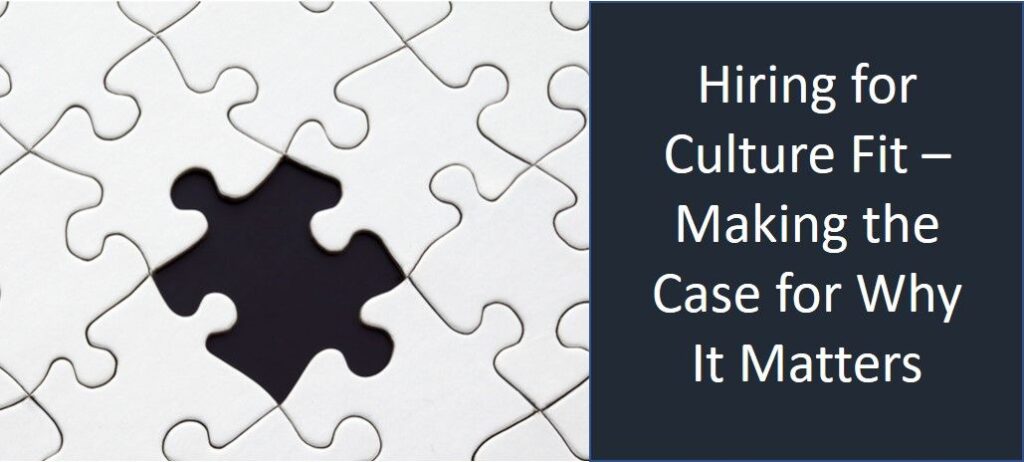Hiring for culture fit is decidedly on the outs these days with a number of recent articles questioning the practice. Some suggest that corporate culture is too dynamic to be captured and codified let alone selected against, while others have argued that skills, experiences and competencies matter far more in hiring decisions. One Globe and Mail article, titled ‘Tech’s Obsession with Cultural fit feeds its diversity problem’ argues that screening for culture fit is often little more than fitting for office lifestyle which often ‘beats out industry knowledge and technical skills’ when making hiring decisions. In other words, culture fit is code for likeability which is code for being one of ‘us’ which has the effect of inhibiting diversity in the workplace. In his estimation, firms ‘sacrifice diversity for the sake of harmony’.
The article then makes the case that diverse teams outperform homogenous teams, and that diversity gives rise to creativity. Rather than focus on culture fit, he argues that firms should focus on ‘mindsets for growth’, agile thinking, a global outlook and the ability to work across different economic sectors. The writer states ‘smart managers know to hire based on where they expect to be in 6 months time, and workers with these approaches are able to adapt and develop as a company grows’.
Let me start by saying that I believe firms should strive for greater diversity in hiring. It is the right thing to do, adds richness to a company, and likely has to be consciously pursued to overcome whatever hiring biases may exist. Also, it has to be acknowledged that it is no small measure to quantify corporate culture and to hire for it. Corporate culture is often aspirational, a work in progress, fuzzy and can vary across and within an organization. All of this said however, addressing the challenge of greater workplace diversity by suggesting that firms abandon hiring for ‘fit’ is overly simplistic and dare I say, wrong.
Corporate culture is the tangled web of values, beliefs, written and unwritten rules and actions that shape the personality and behaviors of a company. It is how things really work in a company, what gets rewarded, punished and ignored. It is what a firm’s leadership pays attention to, measures, controls as well as the assumptions which underlie them. It is the metrics of success, how people are treated, how decisions are made, how scarce resources are allocated, who gets promoted, and how a firm deals with adversity. People who thrive in one corporate culture often do not thrive in another. For example, many people who work at Ottawa-based tech darling Shopify might find similar roles at Canada Post’s head office, but a few kilometers away, to be, let’s just say less than a perfect fit.
We have many clients with very strong values about how people are to be treated, involved in the business, and managed. While they hire for appropriate experience and skills, they pay particular attention to ‘how’ people do what they do. They highly value collaboration. Fit matters to them and they are careful to select employees with an attention to not only whether they have the skills, experience and motivation to succeed but their attitudes, values, level of empathy and emotional intelligence.
In start-ups, hiring for culture fit often means aligning candidate attributes to the founder who, brilliant that he or she may be, is often ‘special’ in other ways. These individuals dominate the culture of their companies. Spanning the spectrum from professional managers to micromanagers to explosive personalities, ‘fitting in’ has little to do with foosball tables and latte machines and everything to do with the ability to be a supporting actor in a one-person production. Ignoring this invariably leads to hiring mistakes.
Finally, suggesting that firms should instead hire for attributes such as mindsets for growth, agile thinking and a global outlook is laying the foundation for hiring people who will fit into environments that value this. You are still back to hiring for fit, just redefining the variables. Oh, and good luck screening objectively for those attributes in most companies.
Hiring should always incorporate an understanding of what an organization values. The problem for most organizations is not the idea of hiring for fit but rather having clarity around the attributes that comprise fit and then having a standardized means by which to assess them. Behavioral questions are awkward, and gut feel is difficult to suppress.
After establishing experience and skill levels, poke and probe candidates about what environments they have most enjoyed in the past and why, which supervisors they have most enjoyed (and why). Look for evidence of adaptability, how or if they have adjusted in the past to different environments. Focus on accomplishments and how these were undertaken, obstacles, and how they were overcome. Remember that motivation matters (it is not only can they do the job but will they do the job)…look for unmet needs, drive, determination, resilience. All of these can be probed for and used to make assessments as to whether someone seems good or is good.
About the Author
Robert Hebert is the founder and Managing Partner of StoneWood Group Inc., a leading executive search firm in Canada. Since 1981, he has helped firms across a wide range of sectors address their senior recruiting, assessment and leadership development requirements.
Contact Robert by email at [email protected] or call (1) 416-365-9494 EXT 777
